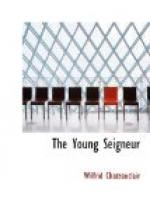“Ah yes, Monsieur Descarries—’with both hands,’”—answered he, bowing quickly; and his signature read, to the Ontarian’s astonishment: “De La Lande, Duke of St. Denis, Peer of France.”
Thus, at this after-mass reception, Chrysler was introduced to a circle of whom he was to see much in the events to follow.
CHAPTER XVIII.
THE AMERICAN FRANCE.
Chrysler and Genest, after reaching the Manoir, sat conversing under the large triple tree on the side of the lawn.
“You have no idea of the simplicity of life here,” l’Honorable philosophised. “We dwell as peacefully, in general, and almost as much in one spot as these great trees. After all, is there any condition in which mortal existence is happier than that of pure air and tranquility. We have a proverb, ‘Love God and go thy path.’ To love God, to live, to die, are the complete circle.”
Chamilly’s entrance put an end to these idyllic observations. He was driven up in a cart by a country jehu, and leaping out, there followed him a couple of friends.
Haviland called Tardif, the head servant, who appeared at the door of the house, bareheaded, with an apron on:
“Bring the dinner out here, Tardif,” he ordered; and a light table was set under the spreading boughs.
“Now tell us, De La Lande, about your trip to Montreal.”
Of the two friends who drove up with their host in the cart, one was Breboeuf, a hunchback. This little creature on being introduced, bowed and shook hands with an aspect of hopeless resignation, and sitting down, relapsed into thought, telescoping his neck into his squarish shoulders. His companion was a young man of small build, but spirited, good-looking face—De La Lande, schoolmaster of the village, a son of the farmer “Duke.”
“And where commence?” responded the schoolmaster to the request for an account of the trip to Montreal.
“In the middle, as I am doing,” retorted Haviland, flourishing the carving-knife over the joint.
“Ah well. The middle was the climax with me. It was the Fete of St. Jean Baptiste!”
“You saw Notre Dame, and the great procession?” inquired the Honorable.
“Yes, I saw that vast Cathedral fifteen thousand full! And the Cure of Colonization climbed up in the midst, and I heard the most glorious words that were ever spoken to French Canadians!”
“Was the procession like ours here?”
“At Dormilliere? Pah!—we have two Cures, a beadle and the choir-boys! Theirs was a mile in length. There were nineteen bands playing music, all in fine uniforms, and there were all the Societies of St. Jean Baptiste walking, with their gold chains and their badges, and as many as forty magnificently decorated cars, bearing representations of the discovery of Canada by Jacques Cartier, and the workings of all the trades, and innumerable splendid banners, of white, and blue, and red and green, with gold inscriptions and pictures—and the Cure of Col——”




